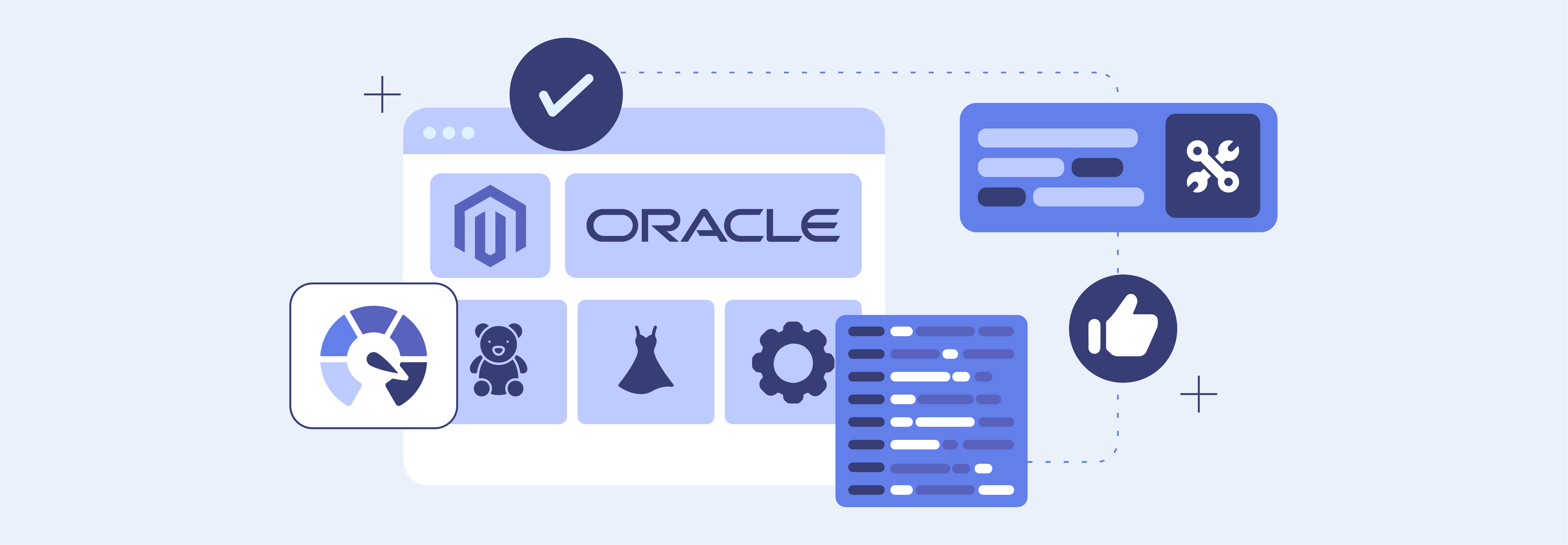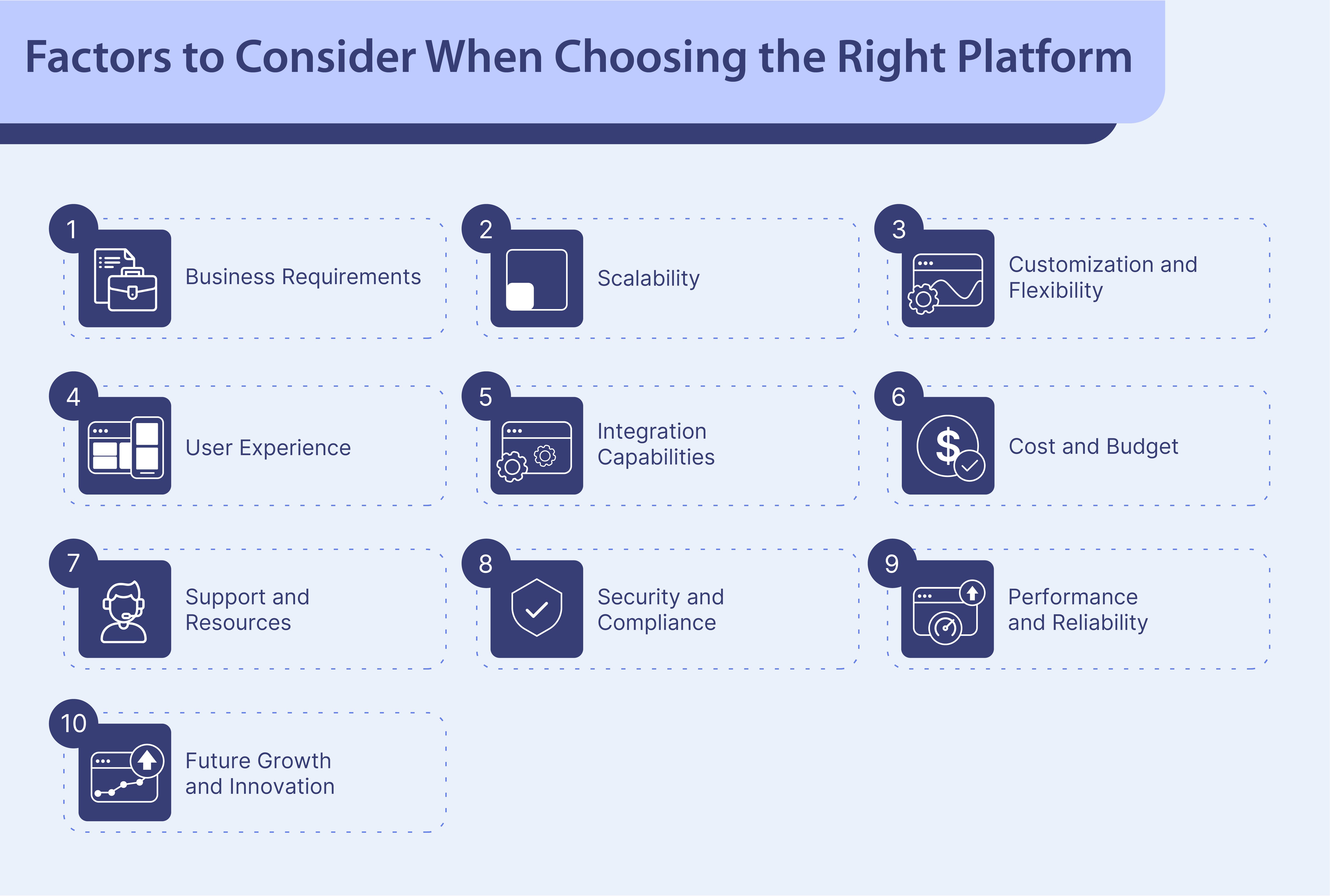
Oracle Commerce vs Magento: Key Differences and Similarities
Are you confused with Oracle Commerce vs Magento? Compare Oracle Commerce vs Magento to discover the ideal platform for your online business needs.
In this article, we will explore the differences and similarities between Magento Commerce vs Oracle Commerce.
Key Takeaways
-
Understand the core features and functionalities of Oracle Commerce and Magento.
-
Delve into the comparison of Magento and Oracle Commerce in terms of company focus.
-
Learn about the similarities between Magento Commerce and Oracle Commerce in e-commerce functionality.
-
Discover essential factors to consider when choosing the right platform for your business.
What is Oracle Commerce?

Oracle Commerce is an enterprise-level ecommerce platform formerly known as Oracle ATG Commerce. It provides businesses with a powerful set of tools to create, manage, and optimize online storefronts and digital shopping experiences.
The platform offers features such as:
-
Merchandising
-
Marketing tools
-
Customer segmentation
-
Personalization.
Oracle Commerce is designed to handle high-traffic volumes, complex product catalogs, and a variety of business models.
Oracle Commerce Cloud aims to help businesses deliver engaging and personalized shopping experiences across various channels. It is often used by:
-
Retailers
-
Manufacturers
-
B2C (Business-to-Consumer) Businesses
-
B2B (Business-to-Business) organizations.
It helps them expand their online presence and drive sales through digital channels.
Differences Between Magento vs Oracle Commerce Cloud
| Aspect | Oracle Commerce | Magento |
|---|---|---|
| Company | Developed by Oracle Corporation. | Originally developed by Varien, Inc., it was later acquired by Adobe Inc. |
| Focus | Oracle Commerce focuses on large enterprises with complex e-commerce needs. | It caters to a wide range of Magento 2 solutions, from small startups to large enterprises. |
| Customization | Oracle Commerce offers customization capabilities, including modular architecture and extension points. | It offers a modular architecture, a large ecosystem of Magento 2 extensions, and themes. It allows businesses to tailor their e-commerce sites extensively. |
| Flexibility | It may require more technical expertise for complex changes. | Magento open source is highly renowned for its flexibility. |
| Scalability and Performance | It is designed to handle high traffic volumes. It can scale for large enterprise deployments with complex product catalogs and high transaction volumes. | Scalable and can accommodate growing businesses. It may require additional optimization efforts for heavily customized implementations to maintain performance. |
| Integration with Other Systems | It smoothly integrates with other Oracle cloud products, such as ERP and CRM. It also helps streamline the Oracle database and business processes. | The Magento platform smoothly connects b2b ecommerce stores with third-party applications. These include payment gateways and shipping providers. It doesn't have native integrations with Oracle products. It offers flexibility through APIs and middleware solutions. |
| Cost and Licensing | The cost of Oracle commerce involves higher upfront costs. These include licensing fees, implementation, and ongoing costs of Oracle. It is only suitable for large enterprises with substantial budgets. | Community Edition is free to use. Enterprise Edition (now Adobe Commerce Cloud) requires a subscription fee. The total cost can vary depending on factors such as hosting, extensions, customization, and ongoing maintenance. |
Similarities Between Magento and Oracle Commerce
| Similarities | Oracle Commerce | Magento |
|---|---|---|
| E-commerce Functionality | It offers powerful ecommerce features of Oracle commerce. These include product catalog management, order processing, payment integration, and customer management. | Magento commerce platform offers essential ecommerce features of Magento. |
| Customization | Oracle Commerce provides customization options through extensions, themes, and APIs. These tailor the online store to specific business requirements. | Magento offers customization capabilities through extensions, themes, and APIs. These allow businesses to extend functionality and create customizations. |
| Multi-Channel Support | Oracle b2b commerce supports multi-channel selling. It enables wholesale ecommerce businesses to sell products through web, mobile, social media, and in-store kiosks. | It provides tools for managing and optimizing omnichannel experiences. It allows businesses to reach customers across different touchpoints. |
| Community and Support | It has an active community of developers, partners, and users, providing documentation, forums, and resources. These help in troubleshooting, best practices, and staying updated on platform developments. | It has an active Magento community offering documentation, forums, and resources. They provide support, troubleshooting, and knowledge sharing. |
| Internationalization | Oracle still supports internationalization and localization features. These enable businesses to sell products in multiple countries and regions. They also manage multiple languages, currencies, and tax regulations. | It provides tools for internationalization and localization. These allow businesses to cater to a global audience with support for multiple languages, currencies, and tax regulations. |
Factors to Consider When Choosing the Right Platform

1. Business Requirements
Assess your specific business needs, including:
-
Type of products you sell
-
Target audience
-
Sales volume
-
Growth projections.
Consider features such as:
-
Product catalog management
-
Order management
-
Payment gateways
2. Scalability
Evaluate the platform's scalability to ensure it can accommodate your business's growth. Consider factors such as:
-
Handling large product catalogs
-
Supporting high-traffic volumes
-
Scalability options for adding new features
-
Expanding to new market share.
3. Customization and Flexibility
Determine the level of customization and flexibility required for your online store. Look for platforms that offer:
-
Customizable themes
-
Extensions
-
APIs
-
Development tools.
These help tailor the store to your specific requirements and branding.
4. User Experience
Prioritize platforms that provide a user-friendly interface and intuitive navigation for both customers and administrators. Consider factors such as:
-
Site speed
-
Checkout process optimization.
These enhance the overall user experience.
5. Integration Capabilities
Assess the platform's integration capabilities with other business systems and third-party services such as:
-
ERP
-
Shipping providers
-
Marketing tools.
Choose a platform that offers smooth integration with Adobe experience. It is through APIs or middleware to streamline operations and data flow.
6. Cost and Budget
Consider the total cost of ownership, including:
-
Upfront costs
-
Ongoing maintenance
-
Hosting fees
-
Additional expenses such as extensions or custom development.
Evaluate whether the platform's pricing structure aligns with your budget and expected return on investment.
7. Support and Resources
Look for platforms that offer:
-
Reliable customer support
-
Documentation
-
Training resources
-
A vibrant community of developers and users.
Consider factors such as:
-
Support response times
-
Available channels (e.g., phone, email, live chat)
-
Access to forums or knowledge bases for troubleshooting and best practices.
8. Security and Compliance
Prioritize platforms that prioritize security measures to protect sensitive customer data. You should also look for a platform that ensures compliance with industry standards such as PCI-DSS. Look for features to safeguard your online stores, such as:
-
SSL encryption
-
Secure payment gateways
-
Regular security updates.
9. Performance and Reliability
Choose a platform that offers powerful performance and reliability to minimize downtime. You should also ensure that it offers a smooth ecommerce experience for customers. Consider factors such as:
-
Server uptime
-
Load times
-
Server infrastructure
-
Scalability options.
10. Future Growth and Innovation
Select a platform that is continually evolving and innovating to meet the changing needs of the e-commerce landscape. Consider the platform's:
-
Roadmap
-
Update frequency
-
Commitment to introducing new features
-
Improvements to stay competitive in the long term.
FAQs
1. Which commerce, in terms of market share, dominates the market?
Magento holds a significant market share in the realm of commerce solutions. It caters to a diverse range of businesses with its robust platform.
2. How to compare magento with Oracle Commerce in terms of specialized online business solutions?
Magento acts as a specialized online business machines tailored to various industries. It provides flexibility and scalability to meet specific business needs effectively.
3. Are there Magento 2 solution providers available to assist with implementation and support?
There are numerous Magento 2 solution providers offering expertise in implementation, customization, and ongoing support. They ensure the smooth operation of Magento-based e-commerce ventures.
4. What are the distinguishing features of Oracle Commerce in contrast to Magento?
Oracle Commerce boasts unique features and capabilities. They provide advanced functionalities for enterprises aiming for sophisticated e-commerce solutions tailored to their specific requirements.
Summary
Understanding Oracle Commerce vs Magento 2 helps in seeking the right ecommerce solution. The article uncovers several other points, including:
-
Oracle Commerce, tailored for large enterprises, boasts powerful tools for creating personalized experiences.
-
Magento commerce cloud caters to businesses of all sizes, renowned for its flexibility and customization options.
-
Both platforms offer essential e-commerce functionalities and support multi-channel selling.
-
Considerations such as scalability and customer experience help make an informed decision.
Ready to implement the perfect fit for your business? Ensure seamless growth and performance with managed Magento hosting.



